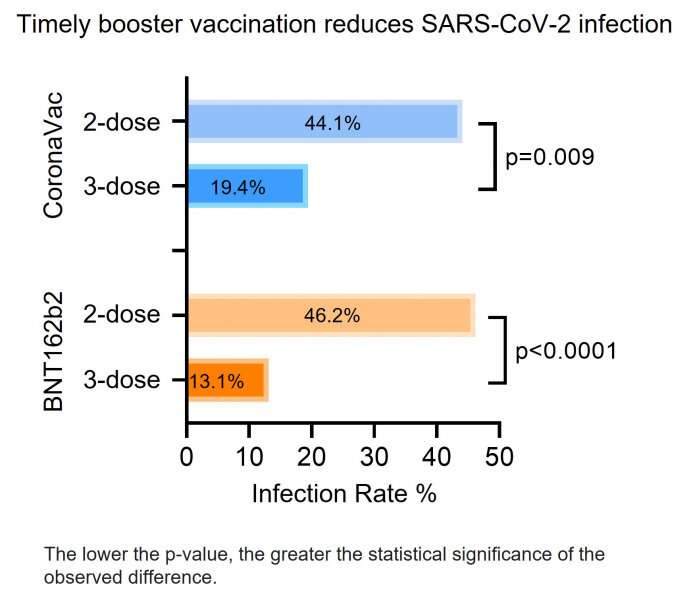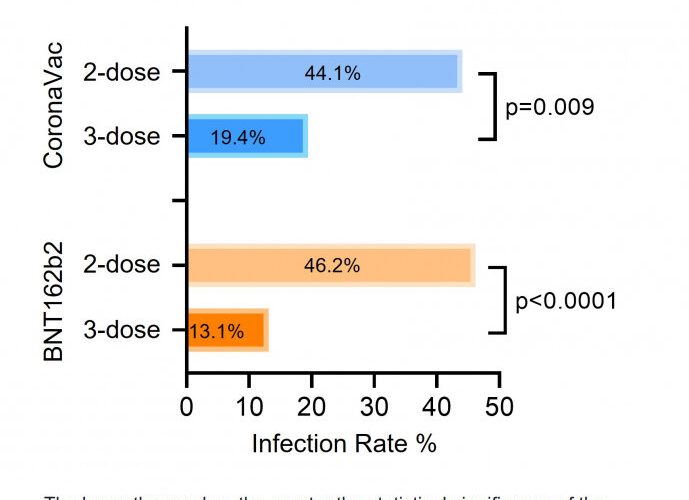Timely booster vaccination reduces omicron breakthrough infections and COVID-19 severity

Researchers at the AIDS Institute, Department of Microbiology, School of Clinical Medicine, and the State Key Laboratory of Emerging Infectious Diseases, LKS Faculty of Medicine of The University of Hong Kong (HKUMed) reveals that the timely third vaccination of either CoronaVac or BNT162b2 is critical to induce activated virus-specific memory B cells and omicron cross-reactive T cell responses, leading to significantly reduced frequencies of breakthrough infection and disease severity.
Neutralizing antibody potency against BA.2.12.1 and BA.4/5 was enhanced by the BA.2 breakthrough infection and bivalent booster vaccination among people who had received prior three doses of vaccines. The research paper is now online in the journal of The Lancet Regional Health—Western Pacific.
The explosive spread of SARS-CoV-2 omicron variants since the end of 2021 in Hong Kong, the city of universal masking in the world, has resulted in the fifth and the largest wave of epidemic with more than 2 million infections and more than 10,000 deaths. Omicron BA.2 dominated this fifth wave due to its high transmissibility and immune evasion, leading to the mortality of 14.39% among the unvaccinated elderly aged 80 and above.
The majority of pre-vaccinated people, however, experienced mild clinical symptoms after the BA.2 breakthrough infection. Since the immunogenicity of CoronaVac (CorV) is weaker than that of BNT162b2 (BNT), it was essential to determine how vaccine-induced immune responses protected omicron BA.2 breakthrough infections. Moreover, with subsequent introduction of BA.4/5 and other variants into the region, immune responses boosted by BA.2 breakthrough infection should be tested for cross-reactive neutralizing antibodies against BA.4/5 and other variants.
Researchers investigated the vaccine efficacy against the omicron BA.2 breakthrough infection among 470 local public servants who had received at least two doses of either BNT or CorV vaccines before BA.2 arrived Hong Kong. Antibody and cellular immune responses after three-dose vaccination were characterized and correlated with clinical characteristics of BA.2 infection. The research team found that the timely third-dose vaccination provided better protection with lower incidence rates of breakthrough BA.2 infections (2×BNT 46.2% vs. 3×BNT 13.1%, p<0.0001; 2×CorV 44.1% vs. 3×CorV 19.4%, p=0.003).
Investigation of immune responses in three-dose vaccination cohorts revealed that the third-dose vaccination-activated spike (S)-specific memory B cells and omicron cross-reactive T cell responses correlated with reduced frequencies of breakthrough infections and disease severity rather than with types of vaccines. Moreover, the frequency of S-specific activated memory B cells was significantly lower in infected vaccinees than uninfected vaccinees before vaccine-breakthrough infection whereas the amount of S-specific CD4 T cells were negatively associated with viral clearance time. Critically, BA.2 breakthrough infection boosted cross-reactive memory B cells with enhanced cross-neutralizing antibodies to omicron sub-lineages, including BA.2.12.1 and BA.4/5, in all vaccinees tested.
“Our findings highlight the importance of activated memory B cells and omicron cross-reactive T cell responses for prevention and disease protection against omicron BA.2. Since BA.2 breakthrough infections mainly recalled vaccine-induced antibody against ancestral strain, emphasize the importance of monitoring cross protection against newly emerged viral variants induced by breakthrough infection and the new bivalent COVID-19 vaccine,” said Dr. Zhou Runhong, Research Assistant Professor, Department of Microbiology, School of Clinical Medicine, HKUMed.
Source: Read Full Article
